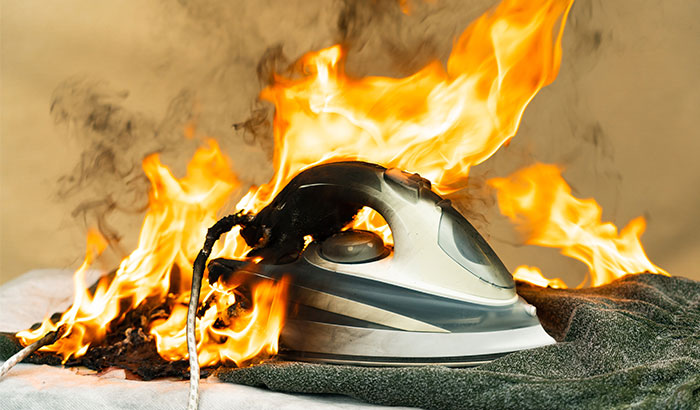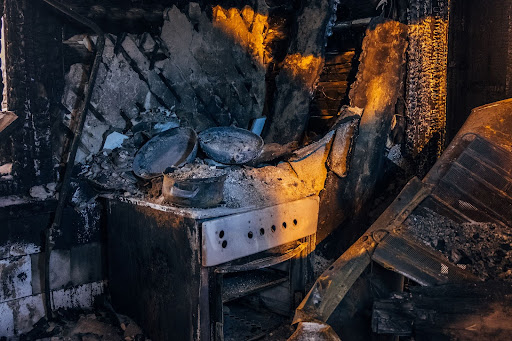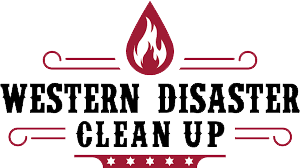
Your house, the place that provides warmth, comfort, and cherished memories, can also be susceptible to the devastating threat of a house fire.
The thought of a fire engulfing your haven can be terrifying, but knowledge and proactive measures can significantly reduce the risk. In this blog post, we will explore 12 different factors that can cause a house fire, shedding light on potential hazards you may not have considered.
By understanding these risks and implementing practical strategies, you can safeguard your home and loved ones from the devastating effects of a fire and avoid the need for fire damage restoration and smoke damage cleanup.
Things That Could Cause a House Fire
From common culprits like candles and smoking materials to unexpected hazards such as Christmas trees and electrical systems, we’ll shine a light on a few of the common causes of house fires, providing insights and practical advice on how to avoid them.
Here are 12 things that could cause house fires:
1. Candles
Candles have long been associated with creating a warm and cozy ambiance in our homes, but they can also pose a significant fire risk if not handled with care. It only takes a moment of distraction or forgetfulness for an unattended candle flame to ignite nearby flammable objects.
To prevent candle-related fires, always ensure that candles are placed on sturdy, heat-resistant surfaces, away from curtains, papers, or any other combustible materials.
Keep them out of reach of children and pets who may accidentally knock them over. Consider using flameless LED candles as a safer alternative, especially in areas where supervision is difficult.
2. Smoking
Smoking poses a significant fire risk, both inside and outside the house. Careless disposal of cigarette butts remains a leading cause of residential fires. Never discard a lit cigarette into a trash can, as it can easily ignite flammable materials.
Instead, ensure that cigarette butts are completely extinguished in designated, fire-resistant ashtrays. If you smoke indoors, make it a rule to do so only in designated areas away from flammable materials. Take extra precautions if you feel drowsy or have consumed alcohol, as the risk of accidental fires increases.
3. Christmas Trees and other Holiday Decorations
The holiday season brings joy and festive cheer, but it’s essential to be mindful of the potential fire risks associated with Christmas trees and other holiday decorations. If you opt for a live Christmas tree, ensure it is fresh and well-watered throughout the season.
Dry trees can quickly become a fire hazard, so keep them away from heat sources such as fireplaces, heaters, and candles. Check the tree’s water level daily and promptly remove it from your home once it starts to show signs of drying out.
When it comes to lights and decorations, use only those that are approved for indoor use and follow the manufacturer’s instructions. Inspect electrical cords for any fraying or damage, and avoid overloading electrical outlets. Additionally, never leave holiday lights on overnight or when you leave the house.
4. Electrical Systems
Electrical systems are an integral part of modern homes, but if not properly maintained or used, they can become a significant fire hazard. Overloaded circuits, faulty wiring, and outdated electrical systems are among the leading causes of electrical fires.
To minimize the risk, you should avoid overloading electrical outlets by using power strips and extension cords responsibly. Regularly inspect your electrical system for any signs of wear, such as flickering lights, sparks, or outlets that feel warm to the touch. If you notice any issues, have them addressed by a qualified electrician promptly.
5. Gas Leaks
Gas leaks pose a severe fire hazard and can lead to catastrophic consequences if not detected and addressed promptly. Natural gas is odorless, but an odorant called mercaptan is added to give it a distinct smell, often described as rotten eggs.
If you detect this odor in your home, it may indicate a gas leak. In such cases, it is crucial not to use any electrical devices, light matches, or create sparks that could ignite the gas. Instead, evacuate the premises immediately and contact your gas company or emergency services.
Regularly inspect gas appliances, such as stoves, water heaters, and furnaces, for any signs of malfunction or damage. Have them regularly serviced by a qualified technician to ensure the proper functioning and minimize the risk of gas leaks.
6. Lightning
While uncontrollable, lightning strikes can pose a fire risk to homes, especially during thunderstorms.
Lightning can set the surrounding area on fire, especially in wooded areas, and ignite your home. If you live in an area prone to thunderstorms, it’s usually recommended to have a surge protector installed. This will help protect against power surges and fires.
7. Children
Children’s curiosity and lack of awareness about fire safety make them particularly vulnerable to fire-related incidents. Educating children about fire safety from an early age is crucial to prevent accidents and promote responsible behavior. Teach them the basics of fire safety, such as the dangers of playing with matches, lighters, or any other fire-starting objects.
Keep matches and lighters out of their reach and sight, preferably in a locked cabinet. Install smoke detectors in their bedrooms and throughout your home to provide early warnings in case of a fire. Create and practice a fire escape plan together, emphasizing the importance of quickly and safely evacuating the house in an emergency.
8. Cooking Accidents
The kitchen is a hotspot for potential fire hazards due to the use of open flames, hot surfaces, and cooking appliances. Unattended cooking is a leading cause of house fires, so it’s essential to stay nearby while the stove or oven is in use. Whether you’re boiling water, frying food, or baking, make it a habit to stay present and attentive.
Keep flammable items like kitchen towels, oven mitts, and paper towels away from the stovetop. In case of a small grease fire, avoid using water to extinguish it, as it can worsen the situation. Instead, carefully smother the flames by covering the pan with a metal lid or baking sheet (don’t use a glass lid, as it will shatter).
Regularly clean your kitchen appliances, such as the stove and oven, to prevent the buildup of grease and food particles, which can ignite and cause fires.
9. Indoor Fireplaces
Indoor fireplaces provide warmth and ambiance during colder months, but they also require careful attention to ensure fire safety. Before starting a fire, make sure the fireplace and chimney are clean and free from debris or obstructions. Use dry and seasoned firewood to prevent excessive smoke buildup, which can increase the risk of chimney fires.
Always use a sturdy fireplace screen to prevent sparks from flying out and keep flammable objects at a safe distance. Never leave a fire unattended, and make sure it is completely extinguished before leaving the room or going to bed. Have your fireplace and chimney inspected and cleaned by a professional annually to detect and address any potential issues.
10. Incense
Incense can create a pleasant and aromatic atmosphere, but it also carries the risk of causing a house fire if not used safely. When burning incense, always place it in a heat-resistant holder designed for that purpose. Ensure the holder is stable and placed on a flat, non-flammable surface.
Keep the burning incense away from any flammable materials, such as curtains, paper, or furniture. Never leave burning incense unattended, and extinguish it completely before leaving the room or going to sleep.
11. Electrical Beauty Tools
Electrical beauty tools, such as hair dryers, curling irons, and straighteners, are common fixtures in our daily routines. However, if not used properly, they can become fire hazards. Start by carefully reading and following the manufacturer’s instructions for each tool. Ensure that the electrical cords are in good condition, without any fraying or exposed wires.
Never leave these tools unattended while in use, and avoid placing them on flammable surfaces, such as beds or couches, where heat can accumulate. Always turn off and unplug the devices after use, allowing them to cool down before storing them.
12. Space Heaters
Space heaters can be a convenient source of warmth, especially during colder seasons. However, they can also pose fire hazards if not used with caution. When purchasing a space heater, opt for models with safety features such as automatic shut-off mechanisms and tip-over protection.
Place the heater on a stable and non-flammable surface, ensuring that it is at least three feet away from any combustible materials, such as curtains, furniture, or bedding.
Never leave a space heater unattended, especially when you’re leaving the room or going to bed. It’s essential to keep children and pets away from space heaters to prevent accidental contact or tipping.

The Fire Damage Restoration Process
In the event that a fire does happen, it’s essential to begin the fire damage restoration process promptly. Safety should be the top priority during this phase. Before entering the affected area, ensure that the structure is deemed safe by professionals. Contact your insurance company to initiate the claims process and seek guidance on fire damage restoration services.
The cleanup process typically involves removing charred materials, salvaging items that can be restored, and properly disposing of debris. Fire damage restoration professionals will conduct thorough soot removal and smoke damage cleanup. They employ specialized equipment and techniques to clean surfaces, upholstery, and belongings affected by fire and smoke damage.
When Disaster Strikes, Trust Western Disaster Clean Up
Are you prepared to handle the aftermath of a house fire? When disaster strikes, Western Disaster Clean Up is here to provide expert assistance in fire damage cleanup and restoration. Our team of experienced professionals specializes in fire and smoke damage cleanup, ensuring that your home is thoroughly restored to its pre-fire condition.
If you need help restoring your home to the way it was before, contact Western Disaster Clean Up today by calling us at 385-381-6539 to schedule a consultation. Let our experts handle the cleanup, so you can focus on rebuilding and moving forward.

